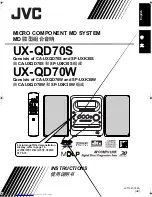
A
NTI
-M
ODE
8033C
INEMA
2. Quick Setup Guide
1. Please read the rest of the manual to get the most out of your system and the
Anti-Mode 8033.
2. Connect the subwoofer signal to "LINE IN"
3. Connect the active subwoofer to “LINE OUT” output.
4. Connect the microphone plug to the "MIC" jack and place and fix the microphone as
close to the listening position (head of the listener) as possible. Use of a microphone
stand helps with correct microphone placement.
5. Connect the power supply to the "9 VAC / 12 VDC" connector and wall socket.
6. The Anti-Mode 8033 will turn on automatically when you plug it in.
Note: All LEDs on the front panel are lit if the device has never been calibrated.
7. Switch on the subwoofer and moderately reduce its volume setting.
8. Press and hold both LIFT and BYPASS buttons for three seconds to start the first
(main) calibration process. Release the buttons when the LIFT25 LED starts flashing.
If you keep holding the calibrate buttons down the calibration process will be aborted.
9. The Anti-Mode will generate at least four frequency sweeps for successful calibration.
When the LIFT25 LED stops flashing the calibration process is completed.
10.For best results, after the Anti-Mode calibration has finished run your AVR's calibration
program to set speaker levels and distances.
2.1. Before Calibration
If you have a small reflex subwoofer, decrease its volume before calibration. If the subwoofer
has a built-in low-pass or other type of filter, it should be deactivated before the calibration
process and re-activated after calibration. Cross-over and low-pass filters in the AVR do not
affect calibration since they take place before the Anti-Mode 8033 in the signal chain. Also,
any other audio equipment connected before the Anti-Mode 8033 will not interfere with the
calibration process.
Pay close attention to the vertical positioning (height) of the calibration microphone since
proper room mode correction may be affected. The microphone is omnidirectional, so its
precise orientation doesn't matter. If you use your subwoofer with doors closed, keep them
closed during calibration. If you want the room correction to affect a wider area, the first
calibration point should be selected near the center of the listening area (or the primary
listening position). More about Wider Area Correction in section 3.
Rev. 1.9
2012-03-20
Page 5 (12)
Figure 4: Setting up the ANTI-MODE 8033






























